| Srl | Item |
| 1 |
ID:
113108
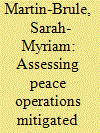

|
|
|
|
|
| Publication |
2012.
|
| Summary/Abstract |
This article seeks to explain why different dimensions of peace operations' success are not always compatible. It puts forward a new typology for better assessing peace operations based on the accomplishment of the mandate and the establishment of order. It provides an explanation of outcomes based on the strategy and the type of interveners. The theoretical framework is applied to 11 peace operations. The analysis shows that mitigated cases are not isolated and result either from the absence of a major military power or from the adoption of a compellence rather than a deterrence strategy.
|
|
|
|
|
|
|
|
|
|
|
|
|
|
|
|
| 2 |
ID:
113103
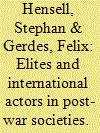

|
|
|
|
|
| Publication |
2012.
|
| Summary/Abstract |
This article analyses the efforts of external actors to influence opportunities for national political elites to gain or maintain positions of power in post-conflict societies. The analysis compares the cases of Liberia and Kosovo, both of which have been characterized by high levels of external intervention though with significant differences in the scope of authority of external actors. Despite these differences, similar dynamics have characterized elite formation in both countries. The impact of external actors on elite systems is mostly indirect, and chances for accumulating authority provided by the national setting determine elite careers. External actors bow to these national conditions rather than decisively changing them.
|
|
|
|
|
|
|
|
|
|
|
|
|
|
|
|
| 3 |
ID:
113105
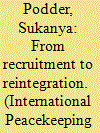

|
|
|
|
|
| Publication |
2012.
|
| Summary/Abstract |
In disarmament, demobilization and reintegration (DDR) programmes, return to home communities is a normative given, around which reinsertion and reintegration support is planned. Yet such an approach is oblivious of pre-war social dynamics of rebel recruitment and civilian experiences of rebel abuse and coercion. These manifest as important sources of social tension between communities and combatants in the post-war period and complicate reintegration. This research shows that the 'recruitment-reintegration' nexus offers a key variable for explaining tensions between civilian communities and ex-combatants in post-conflict Liberia, and could be leveraged in future efforts to improve DDR programmes.
|
|
|
|
|
|
|
|
|
|
|
|
|
|
|
|
| 4 |
ID:
113106
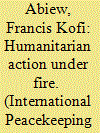

|
|
|
|
|
| Publication |
2012.
|
| Summary/Abstract |
The spate of attacks against humanitarian NGOs since 2003 has raised a series of fundamental questions for humanitarian operations in Iraq, Afghanistan and other conflict and post-conflict situations. This article reflects on the 'new humanitarianism' and how increasingly, this humanitarianism is under attack in violation of the Geneva Conventions on the Laws and Customs of War. It argues that humanitarian action is under attack because of efforts by Western governments (particularly the United States) to make humanitarian NGOs an extension of their military and political agendas. In circumstances of the politicization of humanitarian aid, it becomes difficult for combatants to distinguish between Western governments' agendas and those of NGOs. The article concludes by calling for the insulation of humanitarian aid from politics. This separation of politics and humanitarianism can only be realized by returning to traditional principles that have guided humanitarian action.
|
|
|
|
|
|
|
|
|
|
|
|
|
|
|
|
| 5 |
ID:
113104


|
|
|
|
|
| Publication |
2012.
|
| Summary/Abstract |
This article explores the relationship between the concept of 'organized hypocrisy' and institutional reform in UN peacekeeping. It first demonstrates how the organized hypocrisy in exit strategies arose from the discrepancy between rhetoric, peacekeeping mandates and actions in the field. The analysis then shows how, as a response to organized hypocrisy, peacebuilding replaced the election-based approach of exit strategies from the early 1990s. By evaluating the institutionalization of peacebuilding, the study reveals the hypocritical potential of reform; complex mission mandates, as well as the Peacebuilding Commission, exhibit elements of counter-coupled organized hypocrisy and meta-hypocrisy that remain unresolved.
|
|
|
|
|
|
|
|
|
|
|
|
|
|
|
|
| 6 |
ID:
113107
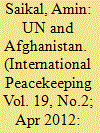

|
|
|
|
|
| Publication |
2012.
|
| Summary/Abstract |
Following more than a decade of NATO's intervention in Afghanistan, it is often argued that the UN, alongside its international partners and the Afghan government, has failed to facilitate good governance and a stable democratic political order. In charting the evolving UN role in 'democratizing' Afghanistan, this article analyses why this is so. The UN Assistance Mission in Afghanistan (UNAMA), facing considerable historical and institutional constraints, has had neither the will nor the capacity to implement its ambitious democratization mandate. Instead of aiming for a system of governance along 'Western' lines, it should focus primarily on promoting an appropriate, institutionalized, workable political order, regional consensus, and national reconciliation as the necessary foundations for bringing peace and stability to the country.
|
|
|
|
|
|
|
|
|
|
|
|
|
|
|
|